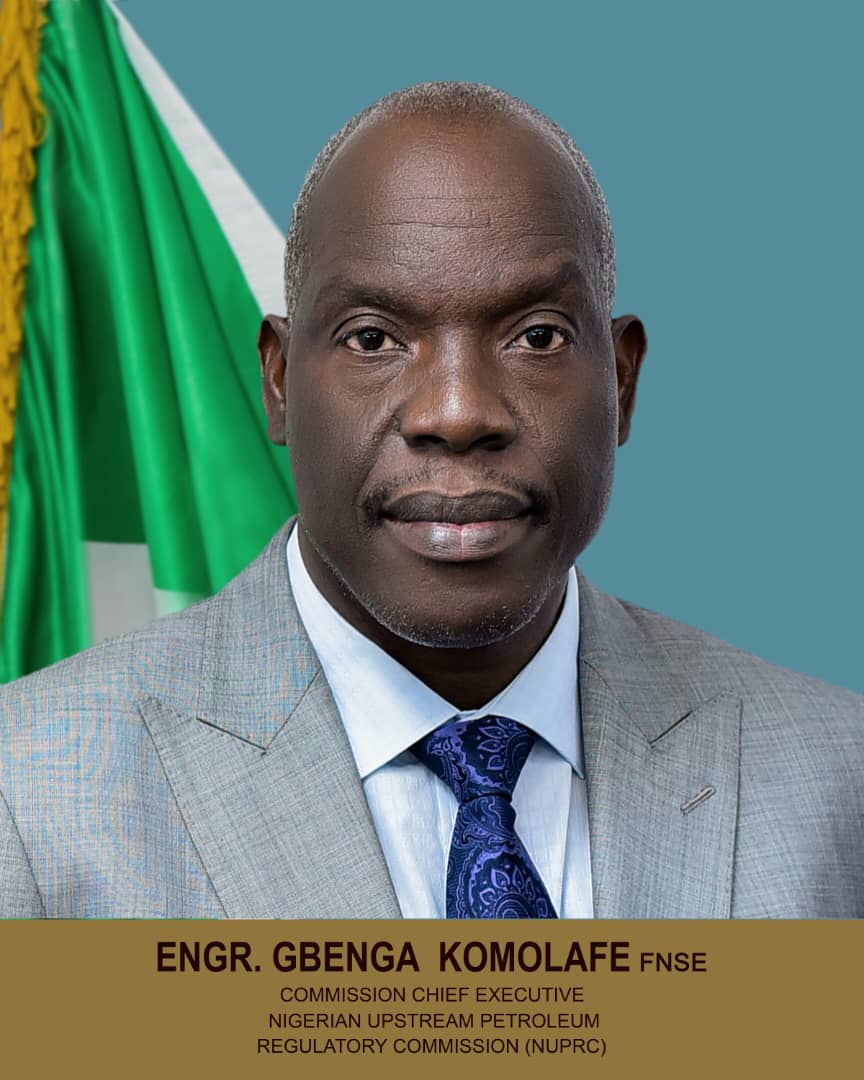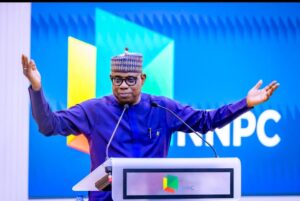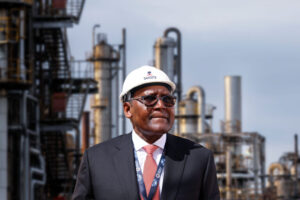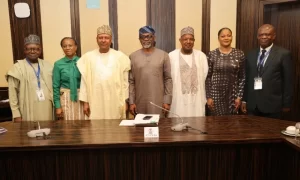
OIL BIDDING: WHY NUPRC PREFERS PRODUCTION BONUS AS STRATEGY TO ATTRACTING INVESTORS BY IBRAHIM MUSA
By Ibrahim Musa
This page is supported by Shell Nigeria. Click here for more information
The Federal Government has emphasized production bonus, which refers to the payment by an operator to a host country upon achievement of oil and gas production, as a strategy for attracting investors to bid for Nigeria’s oil blocks.
Previously, the government relied on a high signature bonus, which refers to a single, non-recoverable lump sum payment made upfront by oil companies for their rights to develop oil blocks, as an option for maximizing revenue generation, thus discouraging investors with limited resources from bidding.
Currently, the Nigerian Upstream Petroleum Regulatory Commission, NUPRC which regulates activities in the nation’s oil and gas industry, has removed all entry barriers to attract massive investments.
This strategy aims at growing oil and gas production, enhancing Nigerian Content Development, attracting Foreign Direct Investment, contributing to long-term global energy sufficiency, expanding opportunities for gas utilization, and creating employment opportunities while adding value to government and investors.
This is based on the Commission’s consideration of developments around the world, especially the sustainable rise in Capital Expenditure, CAPEX, going into funding renewables in the spirit of the global energy transition as well as the level of Signature bonuses in other nations.
In the Middle East and North Africa, the signature bonus currently stands at about $10 million while Thailand and Indonesia have about $3 million (minimum) and N1.5 million, respectively, meaning that Nigeria’s oil and gas landscape is now in alignment with the rest of the world.
This means that Nigeria will be able to complete many projects, leading to the creation of many multiplier effects, including production capacity, employment, contracts, community development, local content and gas-to-power, thus providing more energy to households and businesses nationwide.
Consequently, the NUPRC has been widely commended. The Executive Chairman, African Energy Chamber, NJ Ayuk, said: “Nigeria has established a robust framework that is set to attract foreign exploration companies with modernised fiscals that are competitive for deepwater exploration. We the AEC believe the most lucrative balancing point between creating a welcoming environment for international companies and achieving Nigeria’s own national goals is important.
“Key to this bidding round will be the role of independents and indigenous players when it comes to exploration. The bidding round also paves the way for gas monetisation that will bring amazing benefits to Nigeria and also international markets.”
Similarly, the Executive Director, Emmanuel Egbogah Foundation for Petroleum, Prof. Wumi Iledare, said: “A high signature bonus is regressive. It does make a petroleum province with a high signature bonus less attractive.”
On his part, the National President, Oil and Gas Service Providers Association of Nigeria, OGSPAN, Mazi Colman Obasi, said: “Investors need a conducive environment to put their money. Once the right environment exists, foreign capital will begin to flow in.”
Also, speaking at the recent pre-bidding conference in Lagos, the Commission Executive, NUPRC, Engr. Gbenga Komolafe, said: “A review of Welligence Energy Analytics reports on Licensing rounds across the globe including Brazil, Guyana, Angola, Middle East, North Africa, SouthEast Asia, etc, revealed that the era of huge front-loaded signature bonuses is over.
“Accordingly, Nigeria under President Bola Ahmed Tinubu, as the Minster of Petroleum Resources has proactively and intuitively vacated barrier to entry for investment in exploration blocks being offered, in both the 2022 deep offshore bid round and the 2024 licensing round, in line with international best practices.
“President Bola Ahmed Tinubu and Minister of Petroleum Resources, Nigeria have embarked on a transformative agenda that aligns with the most stringent global standards and commitments. The recent Presidential Executive Orders issued in March this year, aimed at improving the efficiency and attractiveness of Nigeria’s oil and gas sector, were generously targeted to incentivize oil and gas development, introduced measures to balance the implementation of Nigerian Oil and Gas Industry Content Development Act, 2010 to ensure that oil and gas development is not hindered by local content bottlenecks. The Executive Orders also include directives on the reduction of contracting costs and timelines to enhance the global competitiveness of our oil and gas industry and achieve a higher rate of return on oil and gas investments.
“Nigeria is endowed with abundance of Crude Oil and Condensate Reserves and of Natural Gas Reserves representing above 30% and 33% respectively of the entire Oil and Gas reserves in Africa aside abundant mix of other renewable energy resources. In a bid to exploit and optimize these abundant Hydrocarbon resources, Section 7(t) of the Petroleum Industry Act (PIA) empowers the NUPRC, the Industry Regulator to conduct bid rounds for the award of PPLs and PMLs under the Act and applicable Regulations.
“It is on this premise that the Federal Government of Nigeria through the NUPRC recently announced the commencement of the 2024 Licensing Round both in-country and outside the shores of the nation. It would be recalled that we commenced the announcement at the maiden edition of the NEITI Dialogue Session, 2024, where the bid processes were thoroughly interrogated by civil society and the media.
“This was subsequently followed by the announcement of the commencement of the bid round at the 2024 OTC in Houston, the roadshow in Miami organized by Zeste Advisory, African Energies Summit in London organized by Frontier Network and Invest in Africa Energy Summit in Paris organized by Energy Capital Power. The Commission aims to project and attract robust local and foreign investors who will be participating in the bid exercise.
“The NUPRC on behalf of the Federal Republic of Nigeria is committed to conducting the licensing round in a fair, competitive and transparent manner and ensuring a level playing field for both indigenous and international investors. Our approach is underpinned by the robust legal framework of the Petroleum Industry Act 2021(PIA), which ensures compliance with best practices to boost investors’ confidence.
“In keeping with the provisions of the PIA and regulations made under the Act, the Commission has issued a licensing round guideline and published a licensing round plan for the blocks. This round introduces some meticulously selected blocks across diverse geological spectra from the fertile onshore basins to the promising continental shelves and the untapped depths of our deep offshore territories. Each block has been chosen for its potential to bolster our national reserves and stimulate economic vitality. Subsequently, on 13th May 2024, the Commission opened a dedicated bid portal to allow prospective bidders to register/submit Pre-Qualifications documents on or before the stipulated 25th June 2024 deadline.”
He also said: “Interestingly, the Commission, in partnership with its multi-client partners, has acquired more geological data resulting in the identification of more prospective blocks. The newly identified blocks will be added to the pool of blocks originally scheduled for the bid exercise, and their details will be made available on the bid round portal.
“In addition to these blocks, the seven deep offshore blocks from the 2022 Mini-Bid Round Exercise which covers an area of approximately 6,700 km in water depths of 1,150m to 3,100m shall also be concluded along with this Licensing round.”
. Ibrahim Musa is an Energy Analyst






